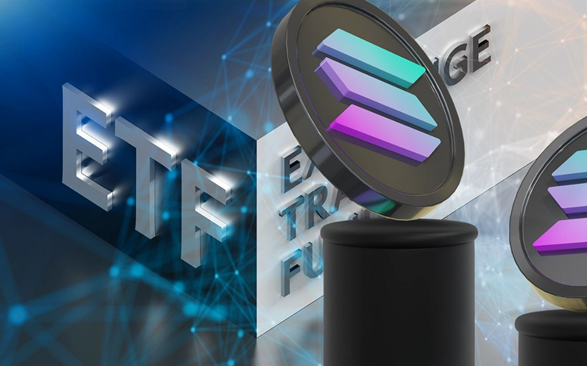The Solana blockchain’s native token, SOL, has recently surpassed its previous all-time high of $259.96, which was set in late 2021. This milestone marks a significant achievement for the SOL ecosystem and has sparked excitement among investors and industry experts.
Austin Reid, Global Head of Revenue at FalconX, expressed his enthusiasm for the upcoming launch of Solana ETFs, stating that it will be a major milestone for the SOL ecosystem and a significant shift for the entire crypto industry. Reid also highlighted the potential for regulatory clarity to pave the way for new investment products, including actively managed funds and basket ETFs, which will unlock new channels of institutional liquidity.
At the time of writing, SOL trades at approximately $257.40, marking a significant increase of over 50% in the past month and 147% year-to-date. This surge in price reflects the growing interest and confidence in the Solana ecosystem, and investors are eagerly awaiting the launch of Solana ETFs to further propel the token’s growth.
Exchange-Traded Funds (ETFs) are a type of investment fund that allows individuals to diversify their portfolios by pooling funds with other investors to invest in a variety of assets, such as stocks, bonds, commodities, or cryptocurrencies. ETFs offer many benefits, including flexibility, diversification, and cost-effectiveness. They can be traded on major stock exchanges, just like individual stocks, allowing investors to quickly and easily buy and sell shares. ETFs also provide instant diversification, reducing risk by spreading investments across multiple assets, and often have lower fees compared to actively managed funds, making them an attractive option for investors seeking to optimize their returns.
With Solana’s rapid growth and increasing adoption, it’s likely that a Solana ETF will be launched by the end of 2025.
Read Also: Solana (SOL) reaches a new all-time: Where is the next stop?
Current State of Solana
Cboe BZX Equity Exchange has filed four applications for spot Solana ETFs, with proposals from prominent asset managers such as VanEck, 21Shares, Bitwise Asset Management, and Canary Capital. This development has sparked optimism among crypto advocates, who believe that the US Securities and Exchange Commission (US EC) is now more likely to approve Solana ETFs.
The US SEC is reportedly engaging with issuers on the S-1 applications, with a final deadline expected around early August. Industry experts, such as ETF Store President Nate Geraci, believe that it is highly likely that Solana ETFs will be approved by the end of next year. Geraci cited the US SEC’s newfound engagement with issuers as a positive sign.
The shift in regulatory winds, coupled with the imminent resignation of US SEC Chair Gary Gensler, have further boosted optimism among crypto advocates. Industry leaders, such as Two Prime Digital Assets CEO Alexander Blume, believe that the success of spot Bitcoin and Ethereum ETFs, combined with a more crypto-friendly administration, will lead to the approval of a Solana ETF within the next calendar year.
Read Also: US SEC drops investigation on Ether: What It Means for Ethereum’s future
Solana DEX volume surpasses $100billion.
Solana achieved a significant milestone in its decentralized exchange (DEX) volume. Solana’s monthly DEX trade volume has surpassed $100 billion, reaching a record high of $109.8 billion in November. This achievement marks a huge increase of 109% from October’s trading volume of $52.5 billion.
The surge in Solana’s DEX volume is an evidence to the network’s growing popularity and adoption. The daily DEX volume also reached a record high of $7.14 billion on November 18, while the weekly DEX trading volume hit an all-time high of $41.6 billion during the week ending November 17. These milestones show the increasing activity and interest in Solana’s ecosystem.
Solana’s DEX volume has not only surpassed its own previous records but also outperformed other major blockchain networks. For instance, Solana’s monthly DEX volume is nearly twice that of Ethereum’s, which stands at $55 billion. This highlights Solana’s growing influence in the decentralized finance (DeFi) space.
The significant increase in Solana’s DEX volume can be attributed to various factors, including high network activity and the growing adoption of DeFi applications on the platform. The surge in Solana’s price, which increased by over 800% between October 2023 and April 2024, also contributed to the growth in DEX volume.
Read Also: Solana Adoption on the Rise: Opportunities and Limitations
Strong on-chain metrics support SOL’s upside
Solana’s recent price gains and soaring DEX volumes can be attributed to a combination of factors, including the surge in memecoins within its ecosystem. The launch of platforms like Pump.fun and Raydium DEX has contributed significantly to this trend, thanks to Solana’s low transaction fees and user-friendly interface. As a result, the monthly fees generated by these platforms have reached record highs, with Pump.fun and Raydium generating $71.5 million and $182 million, respectively, in November.
Solana’s on-chain metrics also paint a positive picture, with the network’s active address count reaching a record high of nearly 25 million in November.
Solana’s market capitalization is currently around 29.5% of Ethereum’s, and is continuing to be repriced. This suggests that Solana’s upside potential is significant, and that the network is likely to continue growing in popularity and adoption. With strong on-chain metrics and a growing ecosystem, Solana could continue being successful.
Read Also: XRP Coin Soars as Ripple secures major victory in U.S SEC lawsuit. What investors should know.
SOL price technicals point upward
From a technical perspective, SOL price has shown significant strength after breaking above a rounded bottom chart pattern on the weekly chart. This breakout suggests that the bulls are now in control, and the price is likely to push towards the technical target of the chart pattern at $300. This represents a potential 19% increase from the current price.
The relative strength index (RSI) is currently in the positive region at 70, indicating that market conditions still favour the upside. However, the RSI also suggests that the market is slightly overbought, which could trigger a correction towards the neckline of the rounded-bottom pattern at $200. This potential correction could provide a buying opportunity for investors looking to enter the market.
It is important to note that technical analysis is not a guarantee of future price movements, and investors should always conduct their own research before making any investment decisions. The cryptocurrency market is known for its volatility, and prices can fluctuate rapidly. As such, investors should be prepared for potential risks and rewards.
Read Also: Bitcoin sets a new all-time high at $87k. What is driving the momentum?
Regulatory challenges that facing the launch of a Solana ETF
The approval of Solana exchange-traded funds (ETFs) had faced significant obstacles due to regulatory uncertainty and rejections from the US Securities and Exchange Commission (SEC). Analysts predicted that the chances of approval in 2024 are near zero, citing the lack of clear regulations and the SEC’s reluctance to advance critical filings. The SEC’s rejection of the Chicago Board Options Exchange’s (CBOE) 19b-4 filings for two proposed spot Solana ETFs has effectively stalled the approval process.
Bloomberg ETF analyst Eric Balchunas believes that the chances of Solana ETF approval are extremely low, stating that it would require a significant change in leadership or a shift in regulatory stance. Nate Geraci, President of the ETF Store, also expressed skepticism, highlighting the absence of CME-traded Solana futures as a necessary condition for approval. However, Matthew Sigel, VanEck’s head of digital asset research, remains committed to launching a spot Solana ETF, drawing parallels between digital tokens and commodities like natural gas.
The fate of Solana ETFs in the US remains highly uncertain due to the murky regulatory landscape. Despite the challenges, some experts believe that the establishment of a clear regulatory framework could pave the way for future ETF approvals. However, until then, the approval of Solana ETFs will likely remain a distant possibility. As the regulatory environment continues to evolve, investors and industry experts will be closely watching for any developments that could impact the future of Solana ETFs. However, these perspectives may have changed due to the resignation of SEC Chair Gary Gensler.
Read Also: What is fueling XRP’s 100% price increase in the past 14 days?
The approval of a Solana ETF is expected to open up new channels, allowing both institutions and retail investors to access crypto via regulated, traditional financial channels. This, in turn, is expected to have a significant impact on the crypto market, with the potential for increased momentum and speculative trading.
Diversification, liquidity, and ease of access are some of the benefits of ETFs. By pooling funds from multiple investors, an ETF allows individuals to gain exposure to a diversified portfolio of assets, in this case, Solana tokens. This diversification can help to reduce risk and increase potential returns. Additionally, an ETF provides liquidity, allowing investors to easily buy and sell shares on a major exchange. This ease of access is particularly important for institutional investors, who may be restricted from investing directly in cryptocurrencies due to regulatory or operational constraints.
The potential demand for a Solana ETF is significant, with both institutional investors and retail traders likely to be interested in gaining exposure to this rapidly growing cryptocurrency. Institutional investors, such as pension funds and endowments, may be attracted to the diversification benefits and liquidity provided by an ETF. Retail traders, on the other hand, may be drawn to the ease of access and the ability to trade Solana tokens on a regulated exchange. With the growing interest in cryptocurrencies and the increasing Solana adoption, a Solana ETF is likely to be in high demand, providing investors with a convenient and regulated way to gain exposure to this exciting new asset class.
The crypto market has already seen significant growth, with spot Bitcoin ETFs reaching over $30 billion in cumulative total net inflow for the first time since launching in January 2024. Total flows across the entire ETF ecosystem have also broken records, crossing the $913 billion mark. With the expected approval of a Solana ETF, the crypto market is poised for further growth and innovation.
Read Also: Predictions and Analyses: Bitcoin Price before and after the US Elections
Risks associated with launching Solana ETFs
The likely launch of a Solana ETF in the future will not be without its challenges and risks. One of the primary concerns is regulatory uncertainty, as the US Securities and Exchange Commission (US SEC) has been hesitant to approve cryptocurrency ETFs in the past. Also, the ETF would need to navigate the complexities of the cryptocurrency market, including volatility, liquidity, and security concerns. Moreover, Solana ETF would need to compete with existing cryptocurrency investment products, such as Bitcoin and Ethereum ETFs. Despite these challenges, many experts believe that a Solana ETF has the potential to be a game-changer for the cryptocurrency market.
The future of Solana and the cryptocurrency market looks promising, with many experts predicting significant growth and adoption in the coming years. The launch of a Solana ETF could be a major catalyst for this growth, providing investors with a convenient and regulated way to gain exposure to the Solana ecosystem.
Read Also: Solana and Its Ecosystem: Blockchain, Token, and Projects
Victor Solomon is a technical analyst at Crypto Asset Buyer (CAB). Over the years, Victor has gained valuable expertise in market analysis, risk management, and community management within the cryptocurrency ecosystem. The founder of Soluvic Crypto Hub, a crypto community where he equips newbies in the space, Victor’s mission is to empower individuals to uncover opportunities and safely navigate risks in the blockchain industry. Victor’s academic foundation includes a BSc. (Ed) in Mathematics, a credential that underpins his strong analytical and problem-solving abilities. Currently, he is expanding his technical expertise as a Software Development student at Brigham Young University. He is an Ex African Manager of Newscrypto.
Discover more from Crypto Asset Buyer
Subscribe to get the latest posts sent to your email.





